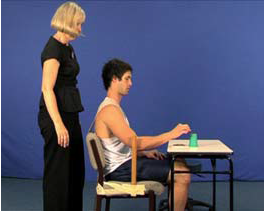AIM:
To train reaching and manipulation using constraint-induced movement to encourage use of the affected upper limb.
Rationale:
Excessive use of the intact arm is a common adaptive strategy patients use when reaching for and manipulating objects. Whole-task training is set up so the patient can practice reaching and manipulation without excessively using the intact arm with feedback and/or manual guidance from the therapist if necessary. Training is structured so that flexibility of performance is encouraged, ie, the cognitive and/or physical demands of the activity are increased.
Equipment:
- Table
- Chair
- Mitten
- Objects, eg. cup, pen, comb, plates, tray
Key Points:
- Patient is positioned in sitting in front of a table
- Therapist puts a mitten on the patient’s intact arm
- Patient reaches for and manipulates a variety of objects with the affected hand
- Ensure explanation for using the mitten is given and patient consent granted
Common Errors:
- Patient attempts to use intact arm
Progression and Variety:
- Decrease/remove manual guidance
- Increase speed of movement
- Increase amplitude of movement
- Vary manipulation component of the tasks
- Increase cognitive demand
- Remove mitten and include bimanual tasks

